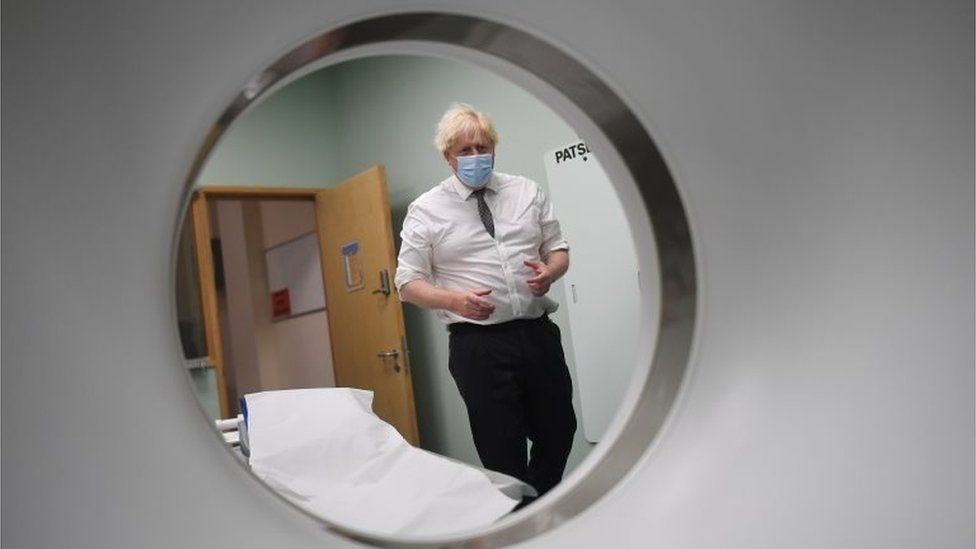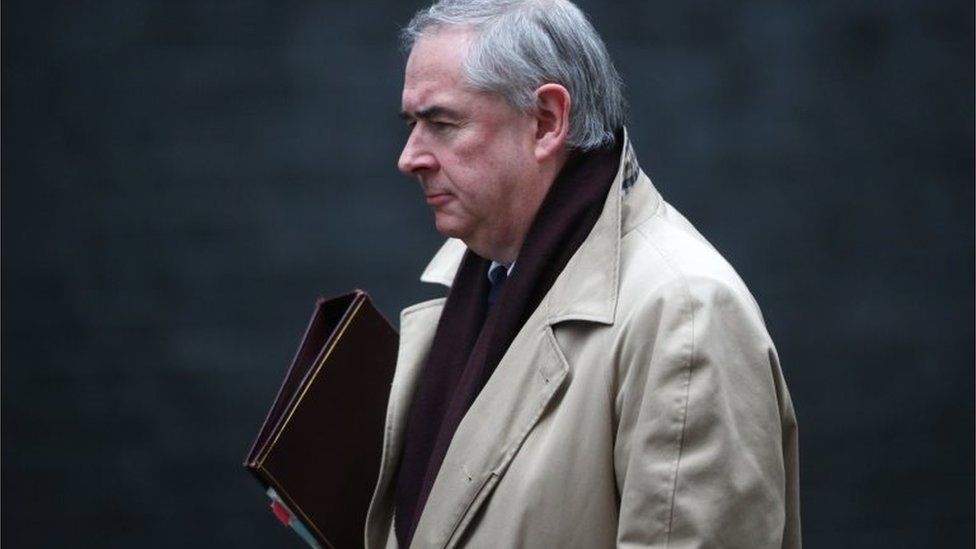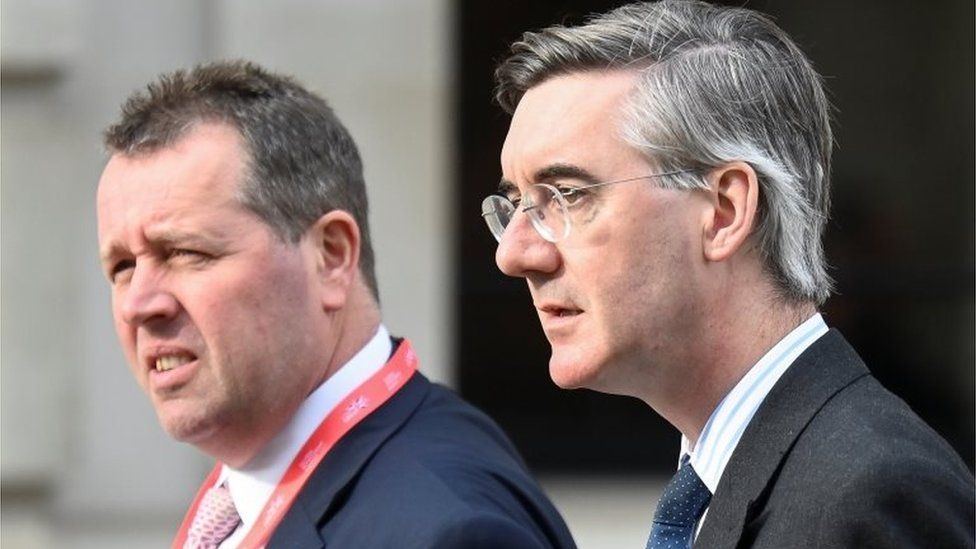
Where's the line? Do you think that MPs should be allowed to do anything on top of the day job?
They are not allowed to talk directly to ministers or government officials on behalf of firms who are topping up their wages.
That rule is crystal clear, and the former minister Owen Paterson was found to have broken it on more than a dozen occasions.
That's why the current stink in Parliament has emerged, as the government's botched handling of his case has provoked an angry conversation about what MPs should be allowed to do at all.
As the system stands, they are allowed to do work alongside the day job of looking after their constituents. Even being a government minister is technically a second job.
And they have to publish anything extra they do that earns them more than £100 in a register.
Scrolling through, there's a remarkable variation in what those additional roles might be.
For some, it's a few shifts in A&E to keep their hand in their former profession, or to help out.
For others, it's offering legal advice that for a handful of MPs can attract eye-watering fees.
More commonly, MPs declare a couple of hundred pounds for taking part in a survey, or penning an article for the newspaper.
Only a few dozen out of the 650 are earning enormous extra amounts that run to the thousands of pounds.
You can read more about what some of them get up to here.

It's not the case that most of them are trousering vast amounts of extra cash, yet concern about what MPs get up to on top of their main job applies far and wide.
But trying to draw new rules up about what is justified and what is not isn't straightforward, and the suggestion has been tried and defeated before - as in 2015.
Would all outside activity be banned? What about that doctor-turned-MP who wants to help out at their local hospital? It might be hard to object to that.
Few constituents might be enthusiastic about the former attorney general, Geoffrey Cox - who the latest register says is earning an extraordinary £400,000 as a lawyer on top of representing the people of Torridge and West Devon.
But what about that lawyer, turned MP, who is doing a few hours here and there for small amounts in needy cases, who must keep doing some practice to keep their qualification fresh? More difficult to say.
There's the common suggestion, pay them "properly", then MPs who do take on extra work might not feel the need.
But "properly"? With their basic salary over £80,000, they already earn far, far more than the average salary.
Who defines what is "proper"? A chunky pay rise, paying to stop a few behaving badly, would be the political equivalent of Parliament punching itself in the face.
And perhaps the focus on second jobs is the less pertinent problem in any case.
'Fast and furious'
There is a debate about the rules around outside interests, and whether the process that monitors them should be redrawn.
But don't forget that the system did identify what Owen Paterson was up to. And there's no consensus yet on anything that might or should change.
But the question, "where's the line" is being asked in Westminster in a different vein. Some Tory MPs are wondering who draws the line on political conduct and decision making in No 10.
The reaction from many on the backbenches when the government tried to protect Owen Paterson and change the rules was fast and furious.
Downing Street screeched into a U-turn quickly. But as much as No 10 may protest, the issue is far from forgotten - and it's stirred up questions again, even among ministers, about Boris Johnson's style in the job - his seeming disregard for rules and convention, and what some see as his reluctance to take much seriously beyond his own political survival.
'Chesney Hawkes prime minister'
It's not gone unnoticed in some circles that two of his staunchest and genuine backers - Chief Whip Mark Spencer and Leader of the House Jacob Rees-Mogg - have found themselves on the end of briefings about who and what went wrong.
One senior Conservative MP branded Boris Johnson today the "Chesney Hawkes prime minister, who must be the one and only", accusing Mr Johnson privately of putting his own interests above all else.
Of course it's easy to whisper in the Commons corridors, but some dissatisfaction has been on public display.
In the Commons tonight, former Chief Whip Mark Harper called for more leadership and a prime ministerial apology.
Two of the 2019 intake defended their decisions to rebel over the Paterson shenanigans - one suggesting in sorrow that now he'd started voting against his party bosses, it might be easier the next time.
Over the weekend the former justice secretary, removed at the reshuffle but normally intensely loyal, wrote in The Times that the government's enormous majority was "irrelevant" if it didn't have a clear plan for action.

That's not to say that there is any significant threat right now to Boris Johnson. He is in possession of that thumping 80 seat majority in the Commons.
Despite a pandemic, concerns about inflation, and this latest round of shenanigans, he remains politically supreme.
Many MPs believe they owe their seats and the scale of the Tory advantage to him. And when it comes to sheer force of personality, he has no near rival right now.
Labour believes that the latest round of allegations about sleaze and cash for cronies is starting to make an impact among the voting public.
No 10 can't just shrug off the allegations about alleged sleaze altogether - not least because there's still an ongoing inquiry into the flat in Downing Street itself. The SNP is trying to involve the police in allegations of cash for honours, and each day seems to bring a new demand for answers.
But Westminster's worst mistake is often to confuse its echo chamber for the mindset of the public.
The opposition parties sniff opportunity. There are plenty of Conservatives who are willing to say privately how unhappy they are about how Mr Johnson behaves.
But Sir Keir Starmer doesn't seem quite sure-footed enough yet on this terrain to turn this mess into a solid long-term advantage.
And angry Tories, to their own irritation, can't quite think of anything workable to do now instead.
One frustrated serving minister who is not a fan of Mr Johnson told me "we're all stuffed until he implodes".
But the last week has shown the prime minister that he can't act with total impunity. Boris Johnson is not the only one who draws the line.
World - Latest - Google News
November 09, 2021 at 05:05AM
https://ift.tt/3keuePR
Owen Paterson row shows Boris Johnson can't act with total impunity - BBC News
World - Latest - Google News
https://ift.tt/2SeTG7d
Bagikan Berita Ini














0 Response to "Owen Paterson row shows Boris Johnson can't act with total impunity - BBC News"
Post a Comment